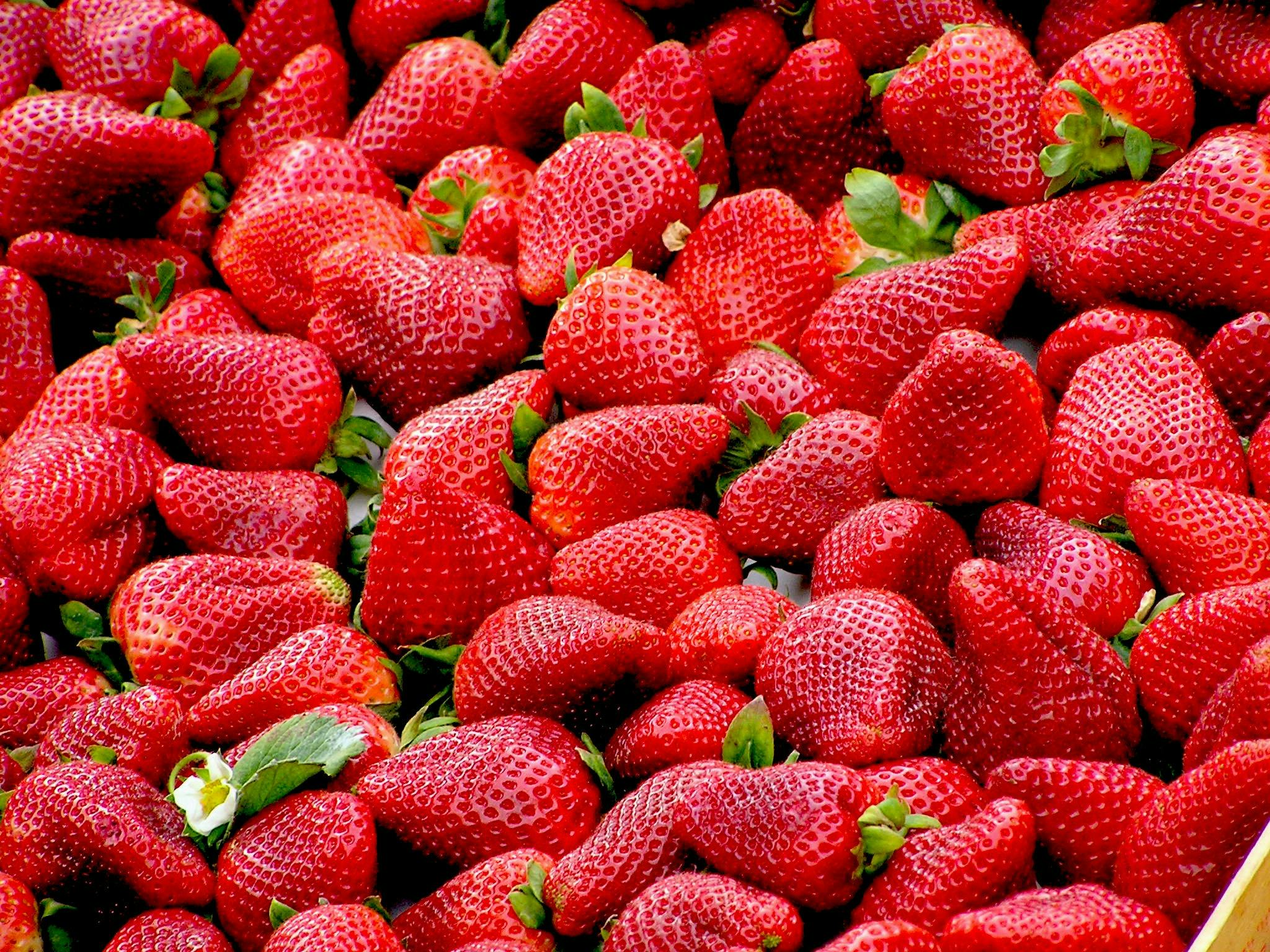Top 10 Nutrition And Health Benefits Of Strawberries

- What Exactly Are Strawberries? Where Do They Come From?
- Strawberries Nutritional Content Explained
- Top 10 Health Benefits Of Strawberries
- 1. Strawberries For Weight Loss Explained
- 2. Strawberries For Immune System Explained
- 3. Strawberries For Antioxidants Explained
- 4. Strawberries For Blood Pressure Explained
- 6. Strawberries For Blood Sugar Explained
- 7. Strawberries For Eyesight Explained
- 8. Strawberries For Mental Health Explained
- 9. Strawberries For Bone Health Explained
- 10. Strawberries For Skin Health Explained
- Strawberry Allergies Explained
- What Happened To Me After I Started Eating More Strawberries?
- Conclusion
What comes to mind when you hear the word “summer”? Depends on who you ask, right? For some, it’s the cool waters of their local beach. For others, it’s soft, smooth ice cream or family barbeques in the late afternoon. And for some, it’s the delicious fruits that the warm weather brings with it. You’re probably thinking along my lines now – strawberries! What makes these little fruits so impressive (aside from their taste)? Read on to learn about all the goodness that a strawberry has to offer.
What Exactly Are Strawberries? Where Do They Come From?

Strawberries Growing.
I know, I know. They’re called strawberries for a reason – because they’re berries! Duh. Um….no. While their name is certainly misleading, true berries are fruits that come from a single flower with a single ovary, such as bananas, avocados, watermelon and pumpkin.
Yep, a pumpkin is more of a berry than a strawberry is! Strawberries are actually called “accessory fruits” or “aggregate fruits”. (But if you referred to them as ‘berries’ until now, don’t worry; most people do!) If you want to be super accurate, they aren’t even fruits; the plant is called a “runner plant” – but it’s generally accepted to call them fruits.
Strawberries belong to the rose family, and the strawberry is a hybrid species of the Fragaria genus. Once planted, a the runner plant will re-bloom every year (a perennial plant), though the produce is best up until about the fifth year of blooming. While wild strawberries have been around for centuries, the garden strawberry is believed to have been first grown in France during the 18th century, and soon replaced the wild strawberry as the common form of the fruit.
Strawberries Nutritional Content Explained
They’re not just delicious, they’re also nutritious! As cliché as that sounds, it’s true. To break it down for you, strawberries are a good source of the following: (per one-cup serving; approximately)
- Fiber – 3-3.8 g
- Carbs – 11-12 g
- Vitamin C – 89-90 mg
- Manganese – 0.6 mg
- Potassium – 233 mg
- Vitamin K – 3.3-3.7 mcg
- Calcium – 23-24.3 mg
- Folate – 25-30 mcg
In addition to things like grams of fiber, strawberries also contain other vitamins like Vitamins B6 and E, as well as minerals like iron, copper and phosphorus.
Top 10 Health Benefits Of Strawberries
1. Strawberries For Weight Loss Explained

Eating Strawberries For Weight Loss.
The good thing about being on a diet is that you can still enjoy delicious foods, and you’re (hopefully) losing weight, and keeping your body healthy at the same time! No, you can’t eat a whole cake (well, you could, but that’s probably not the best way to diet). But you can enjoy delicious, fresh strawberries, on their own or in a low-fat smoothie, as part of your weight loss program.
Aside from being very low in calories, strawberries contain antioxidants known as ellagic acid and anthocyanins, which are anti-inflammatory – and chronic inflammation is a common cause for weight gain. They also slow down your digestion of starches, which prevents a spike in blood sugar. Anthocyanins, in particular, get your metabolism going and suppress your appetite, through stimulating the production of hormones called adiponectin and leptin.
People are often mildly dehydrated and can think that they are hungry when really, they are thirsty. This can obviously lead to weight gain if you’re snacking on something that isn’t doing your waistline any favors. You can keep yourself hydrated by drinking enough water, and also by eating foods with a high water content. Strawberries are 90% water. This makes them a good choice for people who are trying to keep hydrated in order to lose weight.
Plus, they’re sweet and can satisfy your sugar craving in a healthy, non-fattening way.
2. Strawberries For Immune System Explained
While all vitamins deserve a round of applause, Vitamin C usually gets some extra-special attention. And for good reason! Lucky for us, strawberries are jam-packed with this awesome vitamin. In fact, just one serving of strawberries contains 1.5 times the amount of Vitamin C that your body needs in one day.
Why is Vitamin C all the rage? Well, it’s essential for helping your body fight infections and diseases. You’re probably familiar with the age-old advice to take Vitamin C to ease or prevent cold symptoms. Turns out it can help with the flu and other ailments too.
Making Vitamin C even more amazing is that it also has antioxidant properties. This lets it neutralize free radicals in your body, helping to combat the risk of cardiovascular disease.
3. Strawberries For Antioxidants Explained

Strawberries For Antioxidants.
For such small fruits, strawberries sure are packed with antioxidants!
We briefly touched on ellagic acid and anthocyanins, but there are other benefits besides weight loss that your body gets from these antioxidants. Anthocyanins are the reason that strawberries have their beautiful red colour, and they help fight against chronic inflammation and blood clotting, as well as lower your “bad” cholesterol (LDL). All these benefits protect you from developing cardiovascular disease. Ellagic acid (one of the phytonutrients in strawberries), as well, helps to lower cholesterol. It’s also believed to have anti-bacterial and anti-viral properties.
Vitamin C is probably the obvious one: it protects your body from free radical damage and encourages tissue growth and repair. Your body also needs Vitamin C for collagen production, which is what helps your skin, hair and bones to grow healthily. Strawberries are a great source of Vitamin C, and one cup strawberries can fill your entire recommended dose of Vitamin C for the day.
Quercetin, a flavonoid in strawberries, is an anti-inflammatory and an anti-histamine and is also believed to help fight against heart disease and heart attacks.
Folic acid, which is vital for everyone, but especially for pregnant women, is found in strawberries, too.
4. Strawberries For Blood Pressure Explained
Strawberry lovers take note- these little guys are an excellent source of potassium. What is it good for? Absolutely nothing- just kidding! Potassium works in the body to balance out the effects of sodium. In this way, it’s able to reduce blood pressure and help prevent heart disease. And since a happy heart means a healthy body, this benefit should not be overlooked.
Plus, the antioxidants in strawberries can help lower blood pressure by relaxing the endothelium, the lining of the blood vessels. A relaxed endothelium widens a person’s arteries, thereby decreasing pressure. In a study, those who ate more strawberries (and blueberries) and consequently consumed more anthocyanin had a lower risk of high blood pressure.
So it seems that eating strawberries is a great way to control your blood pressure and manage your overall heart health.
5. Strawberries For Blood Sugar Explained
Some foods, and some fruits in particular, contains lots of sugar. Yet strawberries have a generally low glycemic index. Practically, this means that consuming strawberries won’t cause severe spikes in blood sugar levels.
Strawberries also contain dietary fiber, which assists the body in maintaining glucose levels. And the antioxidant anthocyanins, as well as ellagic acid and ellagitannins, are also thought to be helpful in reducing blood sugar levels.
So eating strawberries as part of your diet can lower the risk of you getting type 2 diabetes or even help with your current diabetic symptoms. Studies have found that eating at least 2-3 servings of strawberries a week is enough to significantly minimize the risk.
6. Strawberries For Eyesight Explained

Eat strawberries to help keep your eyes in good shape.
Time for carrots to pass the torch, as they’re not the only ones good for eyesight! Strawberries contain an assortment of flavonoids, ellagic acid, and phenolic phytochemicals. All of these serve to minimize a person’s risk of encountering vision issues relating to age such as macular degeneration.
How do strawberries achieve this feat? The antioxidant compounds target free radicals in the body and stop them from harming healthy parts of the eyes.
The Vitamin C in strawberries can also help protect your eyes by keeping the connective tissue and blood vessels surrounding your eyes healthy. It soothes swelling too. Plus, it can reduce the risk of cataracts. And additional antioxidants found in strawberries can help combat dryness and vision issues.
7. Strawberries For Mental Health Explained
Dementia (the most common form of which is Alzheimer’s disease) is a devastating illness that affects older people, and sometimes middle-aged people as well. Evidence shows that strawberries can also delay the effects of cognitive decline, an important find for those who are suffering from or have family members with Alzheimer’s.
Since cognitive decline is predominantly caused by free radical damage and oxidative stress, scientists are researching how foods rich in antioxidants (known to fight off free radicals) affect your brain. Strawberries were an obvious choice for research, as they fit the bill – they are known to contain powerful antioxidants and anti-inflammatory properties. But the results of the studies were even better than expected.
According to one study, the flavonoids (a sub-class of polyphenols) in strawberries can delay cognitive decline for up to 2 and a half years! This is because they’re great stress-busters and fight off inflammation – which, as we said, is the main reason for cognitive decline.
Microglia are cells that help keep our brains functioning – they remove debris and stuff that would prevent our brains from working properly.
But microglia get old too, and like us, get weaker and more confused – as people age, microglia can take longer to respond to debris, which allows it to build up in the brain, and they can also start to attack healthy cells.
But strawberries contain polyphenols, chemicals that restore the autophagy process (“brain cleaning”); they promote healthy microglia function. In layman’s terms, they fight against what causes dementia, delaying the symptoms.
Not worrying about your old age yet? It’s still a good idea to increase the amount of strawberries you eat – folate is said to improve memory, processing and concentration, which is good news for people of any age. Vitamin C and iodine, besides other health benefits, are also great for your brain health – and yep, you’ll find them in strawberries. To get the most out of strawberries, it’s best to eat them with a healthy breakfast, so you get a brain-healthy boost at the start of your day.
Ever wondered what is the Health Benefits of Strawberries?#healthbehaviors #HealthyEating #HealthyLiving #BeHealthy #GivingTuesday2017 #nutrition #NutriTips #weightloss #weightlossmotivation #loseweight #nutritional #Happy #Smile pic.twitter.com/c76XKnYwMZ
— Jenine_HealthCoach (@JHealthcoach) November 28, 2017
8. Strawberries For Bone Health Explained

Strawberries For Bone Health.
It’s astonishing really, how many people suffer from osteoporosis (a disease which negatively affects bone quality) or are at risk of it developing. To keep your bones in the best shape possible, you need to be getting plenty of bone-healthy nutrients, like calcium (essential for bone-building and healthy bones),
Vitamin K (which keeps calcium inside your bone tissue, and is responsible for the formation of the protein osteocalcin, which helps form your bones), Vitamin C (which is needed for collagen production, and, like Vitamin K, also helps calcium be absorbed into your bone matrix), potassium (which neutralizes acids that weaken bones) and manganese (which is needed for collagen production and bone cartilage).
You may be seeing a common thread here: all these nutrients are contained——- in strawberries! In fact, strawberries have more Vitamin C than an equal amount of oranges has, despite the orange’s reputation as being packed with this essential vitamin.
Getting enough nutrients for bone formation is important whether you are younger (as your bones are still forming) or if you’re older (to keep your bones strong and resistant to decreasing in density). As strawberries contain so many vital minerals and vitamins, you should include them as part of a bone-healthy diet.
9. Strawberries For Skin Health Explained
Vitamin C isn’t just good for your immune system, it can also benefit your skin. The Vitamin C in strawberries allows the body to create collagen, which lets the skin stay soft and fresh. It also helps to repair damaged skin cells.
An added bonus is that the Vitamin C combats free radicals, which steal oxygen from cells and destroy collagen. Consuming strawberries thereby protect the body from signs of aging.
Furthermore, the folic acid in strawberries promotes cell regeneration and the creation of new cells in the body.
Ellagic acid, an antioxidant found in strawberries, protects against the destruction of collagen. It does this by interrupting the production of MMP, enzymes which help destroy collagen. Collagen damage is one of the key roots of wrinkles in the skin. So this antioxidant can have your skin looking and feeling younger.
Strawberry Allergies Explained
You’d be hard-pressed to find a food that no-one is allergic to. However, an allergy to strawberries isn’t one of the most common allergies. Still, it is possible to be allergic to them.
A strawberry allergy can bring on a variety of uncomfortable or dangerous symptoms. These include itchy or irritated skin/hives, wheezing or coughing, vomiting, diarrhea, dizziness, or a severe allergic reaction (though this is rare). Strawberry allergies are commonly genetic. If you’re allergic to strawberries, you’re likely also allergic to pears, peaches, blackberries, apples and cherries – and vice versa.
Those who are severely allergic to strawberries (anaphylactic) will experience more extreme symptoms, such as a rapid pulse, difficulty breathing, loss of consciousness/fainting, and a drop in blood pressure. If not attended to immediately, anaphylaxis can result in death. If you are anaphylactic to strawberries, see your doctor. They’ll probably instruct you to purchase an EpiPen auto-injector (which carries one dose of epinephrine and neutralizes allergy symptoms) and carry it with you at all times.
What Happened To Me After I Started Eating More Strawberries?
Unfortunately, I only recently started discovering all the amazing benefits of strawberries, and being that its winter, there isn’t a strawberry around for miles where I live! I’m well-informed now, though, and come summer, I look forward to indulging in these delicious fruits and reaping the many health benefits.
Is it summer where you’re living/ visiting right now? Lucky you! Go out and buy yourself a tray or two – or go to a strawberry farm and pick out your own! Strawberry picking makes for a great family activity, as well. It keeps adults, teenagers and kids entertained for a good couple of hours. And afterwards, you get to enjoy the delicious, healthy results.
Conclusion
It’s not for nothing that everyone loves strawberries. I’ve never met a person who doesn’t like them. (Sorry to those of you who don’t like strawberries – you’re in the minority here!)
When you used to eat strawberries, you knew they were healthy, sure. But thanks to recent studies we know that strawberries also improve your mental health and bones. All while letting you enjoy a yummy snack or sweet end to your meal at the same time!
But now you know – and I’ll bet you won’t look at this small, unassuming fruit the same way again. It’s time to recognize this fruit as the superfood that it truly is! Enjoy them plain, in whole grain pancakes, or even a beverage like a smoothie. This food is truly a gift to public health.



